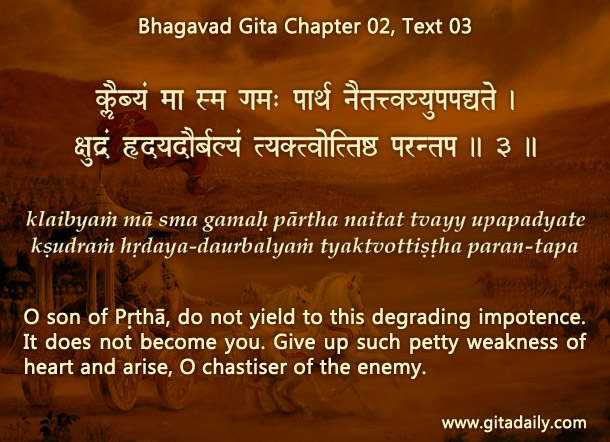
At the start of the Bhagavad-gita, when Arjuna is confronted with the prospect of fighting a brutal war against his venerable elders, he pauses. Throughout the Gita’s first chapter, he advances several well-reasoned arguments against fighting. Thus, he demonstrates laudable concern to avoid thoughtless actions that can have catastrophic consequences not just for him in this and future lives, but also for society at large in this and future generations.
Despite Arjuna’s spirited arguments, Krishna deems his thinking ignorant and his inaction impotent (Bhagavad-gita 02.03). Why? Because Arjuna is unwittingly choosing spineless action. Arjuna’s refusal to fight will lead to disorder and disaster in society because the opponents are led by ruthless rulers. If such rulers were not neutralized, they would plunder society. Moreover, future warriors would follow Arjuna’s example of inaction, thereby creating a terrible tradition of enabling abusers.
Though Krishna reproaches Arjuna’s choice, he doesn’t reject Arjuna’s concern. He addresses that concern by presenting a third option: thoughtful and forceful action. Therein, Arjuna is guided to work not for gaining the kingdom but for fighting to establish dharma, moral and spiritual order in society. Such action is thoughtful because it considers the context and consequence of Arjuna’s choices at a bigger level than what Arjuna has done. And such action is forceful because it enables Arjuna to take an assertive stand against aggressors who have repeatedly refused to learn in any other way.
By learning the Gita’s core principles, we too can choose wisely, avoiding the extremes of thoughtless action and spineless inaction. By carefully understanding the context and consequence of our choices, we too can act in ways that combine inner contemplativeness with outer assertiveness.
One-sentence summary:
Between the extremes of thoughtless action and spineless inaction is the balance of thoughtful and forceful action.
Think it over:
- How was Arjuna’s hesitation to fight laudable?
- How was Arjuna’s hesitation to fight reproachable?
- How did the Gita guide Arjuna to make a balanced choice?
***
02.03: O son of Prutha, do not yield to this degrading impotence. It does not become you. Give up such petty weakness of heart and arise, O chastiser of the enemy.
To know more about this verse, please click on the image
Explanation of article:
Podcast:


Hare Krishna. Had this knowledge available to me about 8- 10 years back I would not have suffered what I am into today .. But still feel good that I am in safe environment of Iskcon and Krishna now will take care here after .
Yes, I too feel the same way – we learn late much what we needed to know earlier. Still, better late than never.